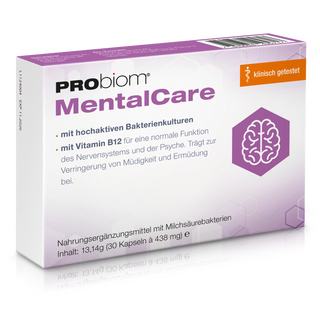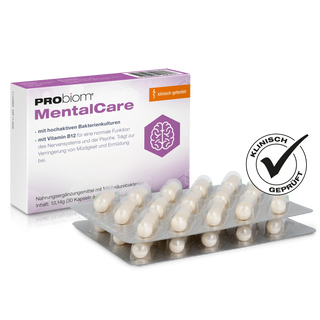Diverticulitis is an inflammatory disease of the colon in which small protrusions in the intestinal wall, called diverticula, become inflamed or infected. Many sufferers suffer from recurring abdominal pain, digestive problems, and impaired well-being. In addition to conventional treatment with antibiotics or, in extreme cases, surgery, the question is becoming more important: Can probiotics support treatment or prevent relapses?
Diverticulitis – when small protrusions cause trouble
Diverticula usually develop in old age when the intestinal wall loses elasticity. They often remain unnoticeable. However, if inflammation occurs, it is called diverticulitis. This can occur acutely or recur repeatedly. Typical symptoms include pain in the left lower abdomen, fever, and changes in bowel habits.
The microbiome as a key player
The gut is home to a vast community of bacteria, viruses, and fungi—the so-called microbiome. It influences digestion, the immune system, and protects the mucous membranes from invaders. When this balance is disrupted, it is referred to as dysbiosis. This imbalance is now considered a key factor in the development and progression of diverticulitis.
How probiotics could work
Probiotics are live microorganisms that, in sufficient quantities, can provide health benefits. The following effects are primarily discussed in cases of diverticulitis:
-
Anti-inflammatory: Certain strains reduce the activity of pro-inflammatory messengers.
-
Strengthening the barrier: They stabilize the mucous membrane and prevent the penetration of germs.
-
Immunomodulation: A balanced intestinal flora ensures a stronger but regulated immune system.
-
Recovery after antibiotics: They help to rebuild the intestinal flora after therapy.
-
Better digestion: By promoting fiber utilization, pressure in the intestines decreases, which could prevent inflammation.
What does research say?
The scientific situation is not yet clear, but there are exciting indications. Individual studies suggest that certain probiotics can reduce the risk of recurrences of inflammation or alleviate symptoms. Preparations containing specific strains such as Lactobacillus casei DG or Escherichia coli Nissle 1917 appear particularly promising.
However, other studies have shown no clear advantage over placebo. Overall, research is still in its infancy, results vary, and a general recommendation is currently not possible.
Opportunities and limitations
Probiotics offer a number of potential benefits, but are not a substitute for established therapies. They can stabilize the microbiome, reduce inflammation, and prolong remission. At the same time, the evidence is limited and highly variable. Not every strain works the same—and not every person reacts in the same way.
Practical tips
-
Consult a doctor: Before you start taking the medication, it is important to speak to a doctor.
-
Targeted selection: Not every probiotic works the same – preparations with researched strains are preferable.
-
Be patient: The effect often only becomes apparent after a few weeks or months.
-
Holistic approach: Probiotics work best in combination with a high-fiber diet, plenty of fluids, and exercise.
-
Self-observation: Reactions are individual – any symptoms such as flatulence should be taken seriously.
Conclusion
Probiotics are not a cure-all for diverticulitis, but they can be a useful supplement —especially for stabilizing the microbiome and potentially preventing relapses. The key is to select specific strains and receive close medical support. Those who use probiotics as part of a comprehensive lifestyle and nutritional therapy have a good chance of supporting their intestinal health in the long term.
FAQ – Frequently asked questions about probiotics and diverticulitis
Can probiotics cure diverticulitis?
No, acute diverticulitis usually requires medication. However, probiotics can provide support and reduce the risk of relapse.
Which probiotics are the most studied?
The strains Lactobacillus casei DG and Escherichia coli Nissle 1917 are particularly well researched.
How long should you take probiotics?
Many studies examined periods of use lasting several months. Short-term use often shows little effect.
Are there any risks?
Probiotics are considered safe for healthy people. In cases of weakened immune systems or serious illnesses, their use should be supervised by a doctor.
Is it enough to eat yogurt or fermented foods?
These can be helpful, but usually don't contain the highly specific strains and quantities tested in studies. For targeted effects, specialized preparations are more suitable.

















